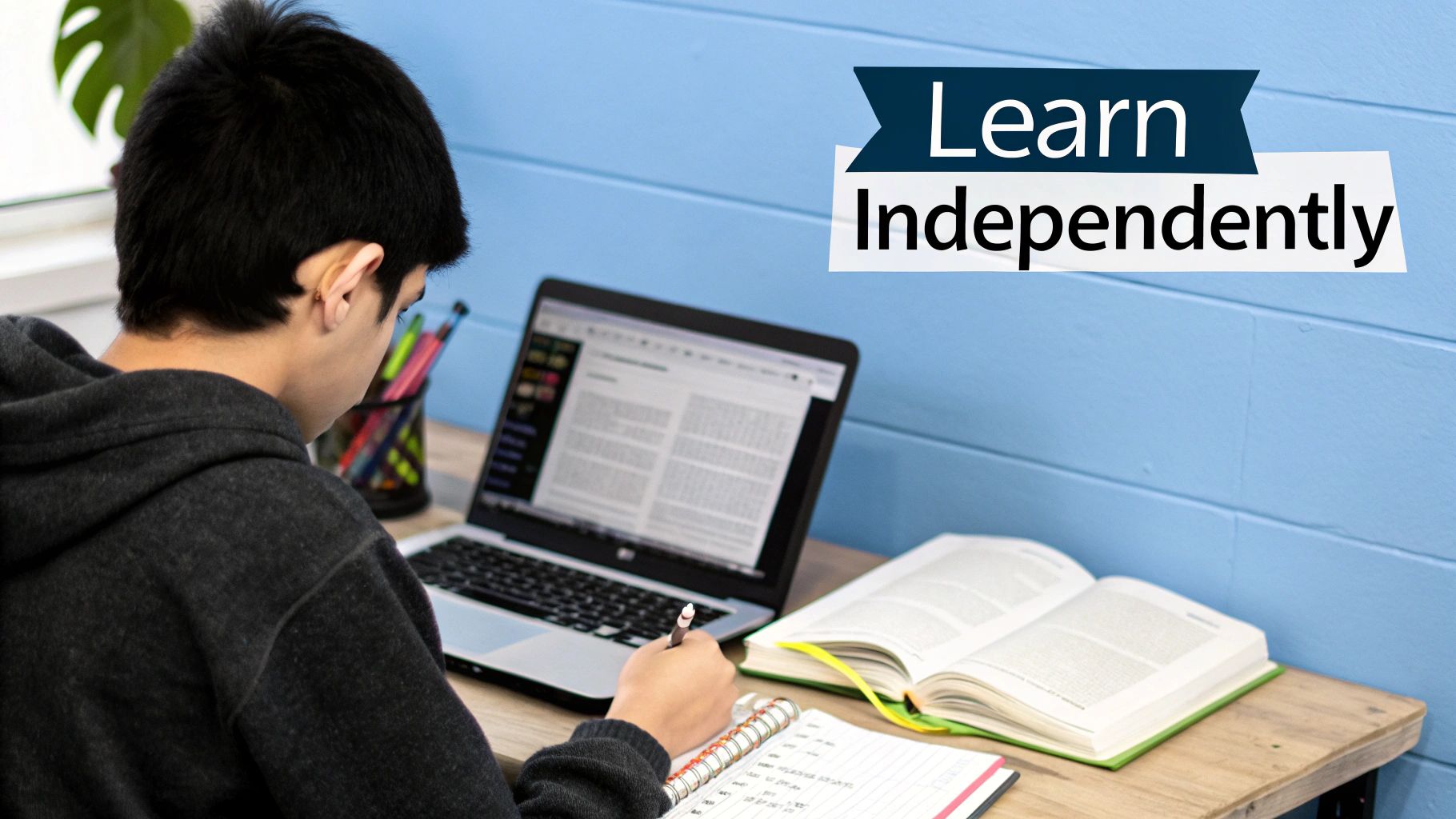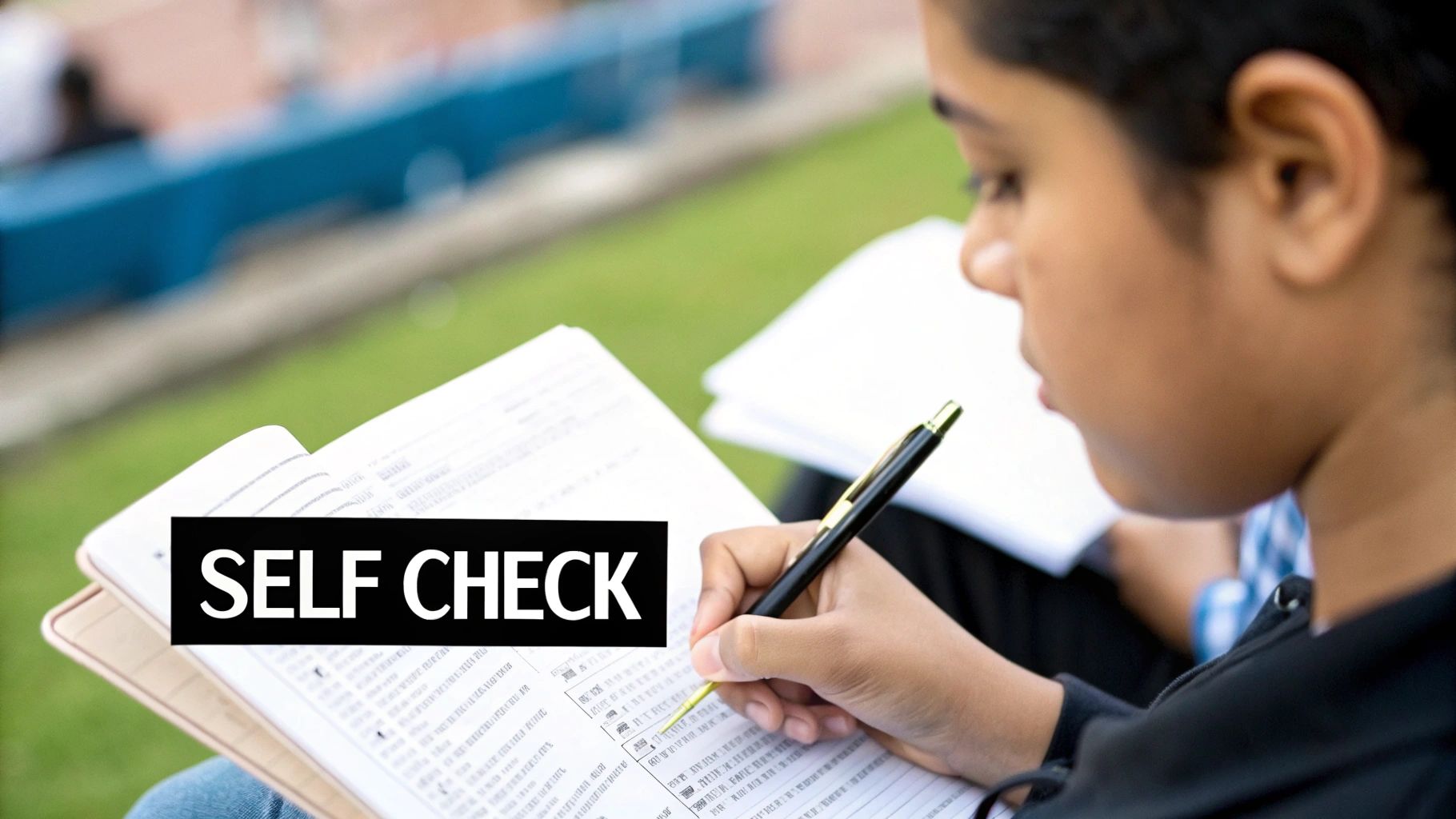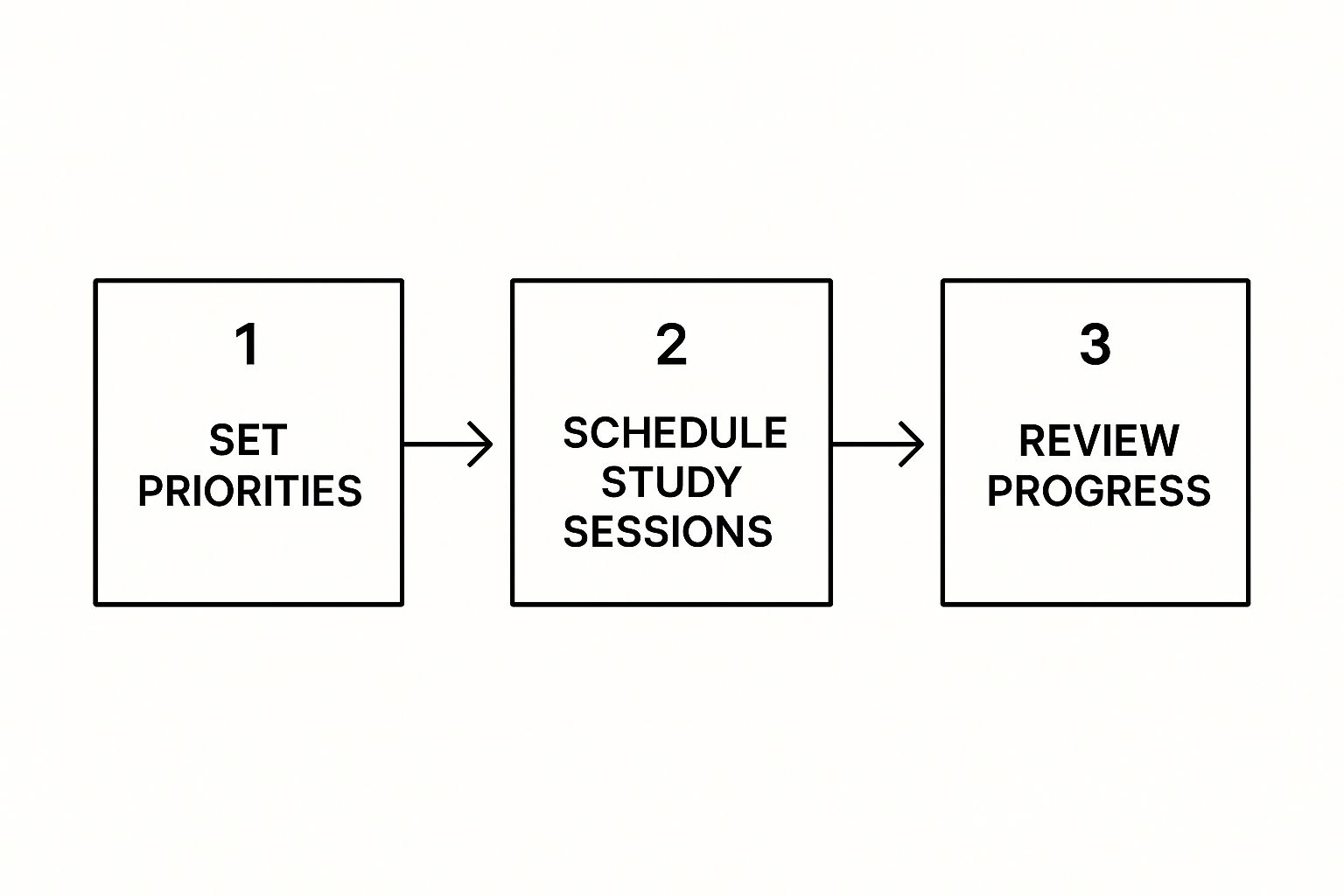When we talk about true independence in learning, we're describing that magical shift when a child goes from asking, "What's the answer?" to confidently saying, "I know how to figure this out." It’s the spark that turns them from a passenger in their own education into the curious, capable pilot of their learning journey. It's the moment of relief and pride you both feel when the homework battles finally fade, replaced by their own quiet determination.
What Does Independence in Learning Actually Mean?

Think back to the first time your child learned to ride a bike. It’s a perfect metaphor for this process. At first, you were right there beside them, one hand on the seat, running alongside and offering constant words of encouragement. This is just like the early years of schooling, where your child needs direct teaching and lots of support to feel safe and secure.
Then came the stabilisers. They offered a safety net, letting your child get the hang of pedalling and steering with more confidence, but still within a safe, structured setup. This mirrors that phase of learning where a student starts tackling problems with guidance. For instance, they might be able to complete a maths worksheet, but they still need you nearby to check the first couple of answers and give them a reassuring nod.
The Moment of True Independence
The moment everyone remembers is when the stabilisers finally come off. After a few wobbly starts and maybe a scraped knee or two, something just clicks. They find their balance, push off, and pedal away, all on their own. That initial fear is replaced by an incredible rush of pride and excitement.
That exhilarating feeling is the very heart of learner autonomy.
It’s the quiet confidence a student has when they finally crack a tough maths problem without asking for help. It’s the flicker of curiosity that leads them to spend an afternoon lost in a book about ancient Rome, just because a history lesson sparked their imagination. This is the transformation we work towards, not just for their grades, but for their spirit.
Independence in learning isn't about leaving a child to struggle by themselves. It's about methodically building their skills and self-belief until they feel capable of navigating challenges, knowing that support is always there if they need it.
This kind of self-reliance is far more than just an academic skill; it’s a life skill. It’s about nurturing a mindset where challenges are seen as opportunities, not dead ends. An independent learner develops:
- Self-Motivation: The desire to learn comes from within, driven by genuine interest rather than just deadlines or grades. You'll see this when they start a new project without being reminded, simply because they're excited about it.
- Resilience: They learn to see mistakes not as failures, but as crucial steps in the process of getting something right. Instead of bursting into tears over a wrong answer, they might say, "Okay, that didn't work. Let me try another way."
- Resourcefulness: They know how to find information, ask the right questions, and use the tools around them to find solutions. They'll start to use a dictionary or search online before automatically coming to you.
Fostering this spirit is key to preparing your child not just for their exams, but for a future where being adaptable and self-directed is what truly matters.
Why Learner Autonomy Is Key for Online Students
In a traditional school, the day is governed by bells, rigid timetables, and the constant direction of a teacher. But in an online school, the dynamic shifts. Your child isn't just a passenger on a predetermined route; they become the captain of their own educational voyage. This move towards independence in learning isn't just a nice-to-have feature of online education—it's absolutely fundamental to their success and personal growth.
When a student truly takes the helm of their own learning, something remarkable happens. You can almost see the weight lift from their shoulders. The goal stops being just about passing tests and starts being about building the real-world skills that will serve them long after their exam results are in.
Building Skills Beyond the Curriculum
Think about a student who starts their online school journey needing constant nudges to log in or complete their work. It's a common fear for parents making the switch. But over time, you start to see a change. They begin to organise their own schedule, blocking out time for a tricky science lesson and making sure they still have a break to do something they love. They take ownership.
This is learner autonomy in action. It’s not about leaving a child to struggle alone, but about empowering them within a structured, supportive environment. Students start to develop abilities that are prized in universities and the modern workplace:
- Resilience: When they hit a wall with a physics concept, their first thought isn't to give up. It's to find another way to understand it, maybe by searching for a video explanation or sending their teacher a specific question.
- Creative Problem-Solving: They learn to think more deeply. A history essay becomes more than a list of dates; it becomes an investigation into why things happened, driven by their own curiosity.
- Time Management: Without a teacher physically ushering them from one classroom to the next, they become masters of their own day, learning to prioritise an urgent assignment over a less critical one, all on their own initiative.
Fostering learner autonomy means nurturing a child's internal drive. It's the engine that powers a fulfilling and successful education, preparing them to confidently navigate future challenges on their own terms.
The Journey to Self-Reliance
This change from being a passive receiver of information to an active, engaged learner is a journey. A student might start the year anxious about asking questions. But by the end of it, you might find them confidently leading a group project, proactively asking their teacher for feedback, and even exploring topics beyond the syllabus simply because they're fascinated. This is the ultimate goal of fostering independence in learning.
This self-directed approach is a cornerstone of successful educational programmes, including the options available for UK homeschooling online. By putting the child at the centre of their own education, we don’t just fill their heads with facts. We give them the confidence and capability to become lifelong learners, fully prepared for a competitive and ever-changing world.
How the UK Workplace Demands Self-Directed Skills

The skills your child develops through independence in learning aren't just for passing exams. They are a direct investment in their future career, a key concern for any parent thinking about the competitive world ahead. The UK job market is no longer just looking for qualifications; it's hunting for people who can think on their feet, solve problems independently, and drive their own professional growth.
Just imagine an employer comparing two candidates with identical degrees. One has only ever followed a script, waiting for instructions. The other, your child, can talk passionately about how they taught themselves a new software for a project or took the lead on a challenging task. It’s obvious which one brings immediate, undeniable value and peace of mind to a manager.
The Rise of the Independent Professional
Today’s working world, especially with the surge in flexible and remote roles, places a huge premium on personal accountability. Employers need people they can trust to manage their own time, take the initiative, and find answers without constant supervision.
This isn’t just a feeling; the data backs it up. A recent study revealed that UK employees now spend 72% more time on learning they seek out themselves, compared to training assigned by a manager. This is a massive shift, showing that the drive to learn and adapt has become a personal responsibility.
This new reality demands a specific set of skills that need to be nurtured from a young age:
- Adaptability: The skill to pick up new software or a different process without fuss. For example, starting a new job and being able to learn the company's project management tool just by exploring it.
- Resourcefulness: Knowing where to look for answers. When faced with a problem, they don't freeze; they know how to search the company's knowledge base or ask a colleague a well-formulated question.
- Proactivity: Spotting a potential issue and dealing with it before being told to. This could be as simple as noticing a recurring client complaint and suggesting a solution to the team.
- Time Management: Juggling multiple priorities to hit deadlines without fail, a skill honed through years of managing their own study schedule.
As the UK workplace doubles down on these skills, understanding effective strategies for successful remote work is crucial, as it highlights the very autonomy that employers now cherish.
Fostering independence in your child's education is not just about helping them with their homework today. It’s about building the professional character that will make them an indispensable employee tomorrow, giving them a critical edge in their career.
By encouraging learner autonomy now, you are giving your child the mindset they need for long-term career resilience. You’re giving them the confidence to walk into any professional environment and not just cope, but thrive. That’s the real return on investment—their future security and success.
Our Method for Cultivating Learner Independence
Talking about learner independence is one thing; actually building it is another. At Queen's Online School, we don’t just pay lip service to the idea. We have a deliberate, child-centred method designed to turn theory into practice, one student at a time.
This isn't about leaving your child to sink or swim. It’s about creating a supportive structure that methodically builds their ability to steer their own education. Our whole approach is built on a simple but powerful idea: genuine learning happens when a student feels seen, heard, and capable. We’ve moved far away from the old one-size-fits-all model, because every child's path to autonomy is unique.
Personalised Guidance Through One-to-One Teaching
The foundation of our method is our one-to-one teaching model. Imagine a teacher who has the time to get to know your child—their unique pace, their natural curiosity, and the exact spots where they need a bit more support. This deep, personal connection allows our teachers to act as expert guides. They know precisely when to step in with help and, just as importantly, when to step back and let the student take the lead.
For example, for a child who is shy about speaking up, a teacher can start with simple, low-pressure questions. As their confidence blossoms, the teacher can begin to ask more open-ended questions, encouraging them to share their own opinions and lead the discussion. This adaptive support is key to nurturing feelings of competence and control, which are the very bedrock of self-motivation.
This student-teacher relationship is all about building trust. When a child knows their teacher genuinely respects their input, they feel safe enough to try, fail, and try again. That’s the cycle that builds lasting resilience.
Igniting Curiosity with Project-Based Learning
We believe learning should be an active pursuit, not a passive one. That’s why we use project-based assignments that encourage students to dig deep, ask their own questions, and become researchers in their own right. Instead of simply memorising facts for a test, they learn how to find, evaluate, and synthesise information for themselves.
Let’s look at the real journey of one of our students, Alex, who felt completely overwhelmed by a big history project.
- Breaking It Down: His teacher didn’t just hand him the answers. Instead, they sat down together and broke the huge project into small, manageable steps. They discovered Alex was fascinated by castles, so they framed the project around that passion.
- Empowering Research: Next, the teacher pointed Alex towards our digital library and other reliable online sources. This simple shift—empowering him to find his own information rather than being spoon-fed—made the project his. He wasn’t just doing an assignment anymore; he was on an adventure.
- Building Confidence: With each small step Alex completed, his confidence grew. The fear turned into excitement. He was no longer just ticking boxes; he was becoming an expert on his chosen topic, proudly sharing facts he’d uncovered himself.
This process completely changes a student’s relationship with their education. For parents exploring different educational paths, understanding the practical steps involved in how to homeschool in the UK can offer valuable insights into creating a similar supportive structure at home. Our entire system is designed to guide students like Alex from a state of dependence to one of proud, capable autonomy.
Practical Ways Parents Can Support Learning At Home
As a parent, your role in your child's education is pivotal. But when it comes to fostering genuine independence in learning, it requires a subtle but powerful shift—moving from being the manager of their education to their most trusted guide. It's about stepping back so they can step forward, empowering them to find the answers themselves instead of just providing them.
When you create a home environment that champions curiosity, celebrates effort, and rewards persistence, you give them the tools to succeed not just in school, but in life. The feeling of seeing them solve a problem you thought you'd have to step in on is one of the greatest rewards.
This isn't just a niche idea; it’s a reflection of a broader cultural shift across the UK. Think about it: participation in online learning among UK adults shot up from just 4% in 2007 to 17% by 2019—that's a staggering 325% increase. By 2020, 21% of Britons were already using online materials for self-directed study, showing that taking charge of your own learning is fast becoming a fundamental modern skill.
Create An Empowering Learning Space
First things first: set up a physical space that invites focus and self-reliance. This doesn't mean you need a dedicated home office. It can be a quiet, organised corner where their books, stationery, and other resources are always within easy reach.
When a child knows exactly where their protractor or their favourite pen is, they’re far less likely to break their concentration to ask for help. It’s a simple habit, but it’s a powerful one that builds a foundation of self-sufficiency and respect for their own workspace.
This small routine helps them take ownership over their work and their day. The process below outlines a simple, effective flow they can adopt to structure their own study sessions—a core skill for any independent learner.

This cycle encourages students to set priorities, manage their time, and review their own progress, creating a powerful feedback loop of self-management. The flexibility offered by online home education in the UK provides the perfect environment to put these habits into practice.
Shifting Your Support From Directive to Empowering
Your goal is to be a supportive co-pilot, not the pilot. This means changing how you respond when your child gets stuck. It’s about asking the right questions, not giving the right answers. The table below contrasts some common parental habits with more empowering alternatives.
| Common Habit (Directive) | Empowering Alternative (Guiding) | Why It Fosters Independence |
|---|---|---|
| Immediately providing the answer to a problem. | Asking, "That's an interesting problem! What's the first thing you think you could try?" | It signals trust in their ability to problem-solve and calms the panic of not knowing. |
| Checking their work and pointing out every mistake. | Saying, "Great effort! Have you had a chance to look it over one more time yourself?" | It places the responsibility on the child, developing their self-correction skills without shame. |
| Dictating their study schedule for them. | Asking, "You have a test on Friday. How do you feel about it? How can we plan your time this week?" | It teaches them planning and self-assessment, putting them in control of their own preparation. |
| Solving disagreements with siblings or peers for them. | Facilitating a conversation: "I hear you're both upset. What do you each need to feel better?" | It builds empathy and conflict-resolution skills, showing they can navigate social challenges. |
This subtle change in how you respond is huge. It sends a clear message: "I trust you to figure this out, and I'm here for you." That vote of confidence builds resilience and self-belief far more effectively than a perfect score on a test ever could.
Remember to celebrate their effort, not just the outcome. Acknowledging, "I saw how hard you worked on that maths problem," validates the process of learning, making them more determined and less afraid of the next challenge.
Preparing Your Child for a Lifetime of Learning

This whole journey is about so much more than just helping your child get through online school. It’s about setting them up for a future where the most valuable assets they can have are adaptability, curiosity, and the resilience to keep going when things get tough.
Every small step you take today to encourage their independence in learning will pay dividends for years to come. It’s a quiet confidence they build, knowing they have the tools to figure things out for themselves. It's the peace of mind you get, knowing they are prepared for a world you can't predict.
By choosing an educational path that actively encourages autonomy, you're giving your child a gift that lasts a lifetime. It’s not just about skills; it’s about shaping their entire outlook. This comes from developing a growth mindset, where they learn to see challenges not as roadblocks, but as opportunities to improve.
You’re not just investing in their grades for this school year; you are investing in their future self. You are nurturing the passionate, resourceful, and capable adult they are destined to become.
There’s nothing more rewarding than seeing your child start to take real ownership of their education. It’s that moment you realise you haven’t just prepared them for the next exam, but for a lifetime of discovery and success.
Your Questions About Fostering Independence, Answered
It’s completely normal to have questions on this journey. Encouraging your child’s independence can feel like a mix of excitement and a little bit of worry. Here are some straightforward answers to the concerns we hear most often from parents.
How Can I Encourage Independence if My Child Lacks Motivation?
The key is to connect responsibility to their passions. If your child feels overwhelmed or disinterested, piling on big new responsibilities will only create more resistance. Instead, focus on building their confidence with tiny, manageable wins related to something they love.
For example, if they love video games, challenge them to research and create a simple "how-to" guide for a level they've mastered. If they're passionate about art, let them be in charge of researching and ordering their own art supplies online. When they accomplish it, celebrate that small success. This creates a powerful link in their mind: "When I take charge of something I care about, I feel capable and proud."
At Queen’s Online School, our one-to-one approach is all about finding that personal spark. We discover what makes a child tick, turning learning from a chore into a choice.
Is There a Difference Between Fostering Independence and Just Leaving My Child Alone?
Yes, and this is a crucial distinction. Fostering independence in learning isn’t about being hands-off; it’s about providing a safety net from a distance. Think of it as being the co-pilot. You're there to help navigate the turbulence, but you trust your child to fly the plane.
Independence is built on a foundation of trust. Your presence—knowing you're available in the next room—gives them the emotional security they need to try, to make mistakes, and to learn from them without fear. It’s not about absence; it’s about supportive presence.
Is an Online School Really Better for Promoting Independence?
A well-structured online school environment creates a natural training ground for self-reliance. Without the rigid bells and corridors of a physical school, students must take more ownership of their day. They learn essential life skills, like managing their schedule to meet deadlines and communicating proactively with teachers via email or chat.
For example, if a student is unclear on an assignment, they can't just wait for the teacher to notice their confused expression in a crowded classroom. They learn to compose a clear, specific question and send it to their teacher. This simple act is a powerful step towards self-advocacy. Our platform provides the academic framework, but within it, students have the freedom and the necessity to become resourceful, self-disciplined learners.
At Queen’s Online School, we create the supportive, structured environment where children build the confidence to become capable, self-directed learners. Find out how our expert-led, personalised approach can unlock your child's potential at https://queensonlineschool.com/.

